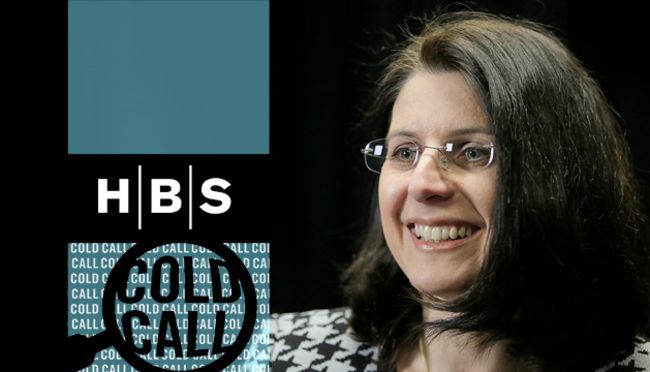Cost →
→

- 11 Apr 2023
- Cold Call Podcast
A Rose by Any Other Name: Supply Chains and Carbon Emissions in the Flower Industry
Headquartered in Kitengela, Kenya, Sian Flowers exports roses to Europe. Because cut flowers have a limited shelf life and consumers want them to retain their appearance for as long as possible, Sian and its distributors used international air cargo to transport them to Amsterdam, where they were sold at auction and trucked to markets across Europe. But when the Covid-19 pandemic caused huge increases in shipping costs, Sian launched experiments to ship roses by ocean using refrigerated containers. The company reduced its costs and cut its carbon emissions, but is a flower that travels halfway around the world truly a “low-carbon rose”? Harvard Business School professors Willy Shih and Mike Toffel debate these questions and more in their case, “Sian Flowers: Fresher by Sea?”

- 31 Jan 2023
- Op-Ed
Can Insurance Technology Solve the Uninsured Driver Problem?
High fees prevent many drivers from buying auto insurance—often with catastrophic consequences. Raymond Kluender offers a novel way to make coverage affordable and roads safer: Let drivers pay for only the days they drive.

- 03 Sep 2020
- Op-Ed
Why American Health Care Needs Its Own SEC
The United States needs a health care equivalent of the Securities and Exchange Commission to increase transparency and competition, argues Regina Herzlinger. Open for comment; 0 Comments.

- 12 Jul 2020
- Working Paper Summaries
Sticky Capital Controls
One of the legacies of the 2007–2008 global financial crisis has been a reassessment of the potential for restriction of capital flows policies. This paper documents a set of stylized facts on capital controls along their intensive and extensive margins for emerging markets and document them to be “sticky.” We then rationalize them through a model that includes fixed cost of implementing such policies, which lower the welfare gains of implementation.

- 27 Feb 2020
- Sharpening Your Skills
How Following Best Business Practices Can Improve Health Care
Why do Harvard Business School scholars spend so much time and money analyzing health care delivery? Open for comment; 0 Comments.

- 29 Jan 2019
- Research & Ideas
'Green Bonds' May Be Our Best Bet for Environmental Damage Control
The popularity of green bonds as a way to finance environmentally friendly projects is on the upswing, say Malcolm Baker and George Serafeim. Open for comment; 0 Comments.

- 24 Sep 2018
- Research & Ideas
How Cost Accounting is Improving Healthcare in Rural Haiti
The cost of healthcare in rural Haiti was found to vary widely, even inside the same health organization. A pioneering cost accounting system co-developed by Robert Kaplan was called in to determine the cause. Open for comment; 0 Comments.

- 15 Mar 2018
- Working Paper Summaries
Targeted Price Controls on Supermarket Products
Governments sometimes consider targeted price controls when popular goods become less affordable. Looking at price controls in Argentina between 2007 and 2015, this study’s findings suggest that new technologies like mobile phones are allowing governments to better enforce targeted price control programs, but the impact of these policies on aggregate inflation is small and short-lived.

- 07 Mar 2018
- Research & Ideas
Electronic Health Records Were Supposed to Cut Medical Costs. They Haven't.
Digitizing patient information promised to cut health care costs by driving down administrative expenses. So why can it cost a doctor more than $200 to process a single bill? New research by Robert Kaplan and colleagues. Open for comment; 0 Comments.

- 23 Jan 2018
- Working Paper Summaries
Transaction Costs and the Duration of Contracts
When buyers transact with sellers, they select not only whom to transact with but also for how long. This paper develops a model of optimal contract duration arising from underlying supply costs and transaction costs. The model allows for the quantification of transaction costs, which are often unobserved, and the impact of these costs on welfare.

- 23 Mar 2017
- Cold Call Podcast
Cost-cutting Leads to Turbulence in the Airline Industry
When a business known for delivering an exemplary customer experience faces cutbacks, what services get chopped? Assistant Professor Susanna Gallani discusses a recent case study about an airline that looks not just to survive a downturn but emerge stronger. Open for comment; 0 Comments.
- 15 Dec 2014
- Research & Ideas
Deconstructing the Price Tag
A new study by Bhavya Mohan, Ryan Buell, and Leslie John has an important conclusion for retailers: Explaining what it costs to produce a product can potentially increase its sales. Open for comment; 0 Comments.
- 22 Aug 2012
- Research & Ideas
Advertising: It’s Not ‘Mad Men’ Anymore
Three major forces have changed advertising since Don Draper last prowled the corridors of Sterling Cooper. Professor Emeritus Alvin J. Silk's decades of research finds an industry that, while evolving in fundamental ways, is healthy and creative. Open for comment; 0 Comments.
- 28 Jun 2004
- Research & Ideas
How to Avoid a Price Increase
Consumers hate price increases, but what is a company to do when material costs skyrocket? One answer: Think small. Professor John Gourville considers the alternative in this Q&A. Closed for comment; 0 Comments.

How Can Financial Advisors Thrive in Shifting Markets? Diversify, Diversify, Diversify
Financial planners must find new ways to market to tech-savvy millennials and gen Z investors or risk irrelevancy. Research by Marco Di Maggio probes the generational challenges that advisory firms face as baby boomers retire. What will it take to compete in a fintech and crypto world?